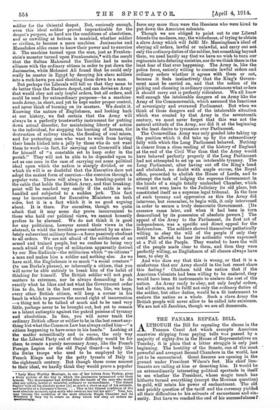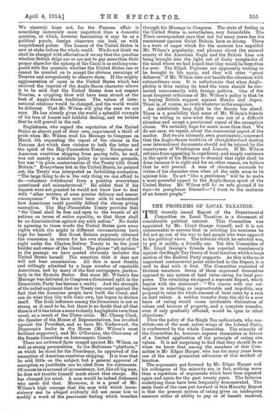THE PANAMA. REPEAL BILL.
ALTHOUGH the Bill for repealing the clause in the Panama Canal Act which exempts American coastwise shipping from paying tolls was passed by a majority of eighty-five in the House of Representatives on Tuesday, it is plain that a bitter struggle is only just beginning. The hostility of the Senate, one of the most powerful and arrogant Second Chambers in the world, has yet to be encountered. Great fissures are opening in the ground under President Wilson's feet. His chief lieu-' tenants are railing at him or deserting him. It would be an extraordinarily interesting political spectacle in itself to see whether the President, whose magic touch has hitherto turned everything (except the Mexican question) to gold, will retain his power of enchantment. The old and prickly question of the tariff and the currency yielded all their difficulties to his solvents of earnestness and sin- cerity. But have we reached the end of his successfulnese
We sincerely hope not, for the Panama affair is something immensely more important than a domestic question, at which, however fascinating it may be as a political puzzle, foreign observers can look on with unquickened pulses. The honour of the United States is now at stake before the whole world. We do not think we shall be charged with affectation if we say that the question whether British ships are or are not to pay. more than their proper share for the upkeep of the Canal is as nothing com- pared with the question whether the United States can or cannot be counted on to accept the obvious meanings of Treaties and scrupulously to observe them. If the mighty agglomeration of races in the United States which has received the imprint of the Anglo-SaxOn character allows it to be said that the United States does not respect Treaties, a crippling blow will have been struck at the best of Anglo-Saxon traditions. The values of inter- national relations would be changed, and the world would be different. That Mr. Wilson will play the man we are sure. He has already given the world a splendid example of his love of honest and faithful dealing, and we believe that he will prevail in the end.
Englishmen, who regard the reputation of the United States as almost part of their own, experienced a thrill of pride when Mr. Wilson read his Message to Congress on March 5th requesting the repeal of the clause in the Panama Act which does violence to both the letter and the spirit of the Hay-Pauncefote Treaty.• Exemption of American coastwise shipping from paying tolls, he said, was not merely a mistaken policy on economic grounds, but was " in plain contravention of the Treaty with Great Britain." Everywhere but in the United States, he pointed out, the Treaty was interpreted as forbidding exemption. "The large thing to do is the only thing we can afford to do—voluntary withdrawal from a position everywhere questioned and misunderstood." He added that if his request were not granted he would not know how to deal with "other matters of even greater delicacy and nearer consequence." We have never been able to understand how Americans could possibly defend the clause giving exemption. The Hay-Pauncefote Treaty provides that " the Canal shall be free and open to the vessels of all nations on terms of entire equality, so that there shall be no discrimination against any such nation." No doubt in agreeing to those words the United States gave away rights which she might in different circumstances have kept for herself. But Great Britain expressly obtained the concession in return for her own abandonment of the right under the Clayton-Bulwer Treaty to be the joint builder and owner of the Canal. The phrase "all nations" in the passage we have quoted obviously includes the United States herself. The assertion that it does not will not bear examination. All this is most frankly and willingly admitted by a large number of reputable Americans, and by many of the best newspapers, particu- larly in the Eastern States. But since Mr. Wilson's fine Message was delivered to Congress a threatened split in the Democratic Party has become a reality. And the strength of the naked argument that no Treaty can count against the fact that the American people have built the Canal, and can do what they like with their own, has begun to declare itself. The Irish influence among the Democrats is not so strong as it used to be, but there is no doubt that all that there is of it has taken amoreviolentlyAnglophobe turn than usual, as a result of the Ulster crisis. Mr. Champ Clark, the Speaker of the House of Representatives, has revolted against the President, and so have Mr. Underwood, the Democratic leader in the House (Mr. Wilson's most brilliant supporter), and Mr. O'Gorman, the Chairman of the Senate Committee on Interoceanic Canals.
There are awkward facts ranged against Mr. Wilson, as well as strong personalities. In the Baltimore "platform," on which he stood for the Presidency, he approved of the exemption of American coastwise shipping. It is true that he said little on the subject, but a general approval of exemption as justifiable can be cited from his statements. Of course he is accused of inconsistency, but, like all big men, he does not trouble himself much about that charge. He has changed his mind. A man would be indeed dishonest who never did that. Moreover, it is a proof of Mr. Wilson's high courage that the ease with which incon- sistency can be alleged evidently did not cause him to modify a word of the passionate feeling which breathes through his Message to Congress. The state of feeling in the United States is, nevertheless, very formidable. Tho Times correspondent says that not for many years has the resentment against Great Britain been so strong. There is a wave of anger which for the moment has engulfed Mr. Wilson's popularity, and phrases about the natural enmity of the American Eagle and the British Lion are being brought into the light out of dusty receptacles of the mind where we had hoped that they would lie forgotten for ever. The Elijah Pograms are apparently waiting to' be brought to life again, and they will utter "great defiances " if Mr. Wilson does not handle the situation with extraordinary care. It is unfortunate that when Anglo- phobia is thus raising its head the issue should be con- nected unnecessarily with foreign politics. One of the most frequent criticisms of Mr. Wilson's policy is that he is buying British support against Mexico and Japau. There is, of course, no truth whatever in the suspicion. An indefinitely long fight in the Senate lies ahead. There is a possibility that some of Mr. Wilson's friends will be willing to save what they can out of a difficult situation and accept a provisional repeal of the exemption clause. We certainly hope for much more than that. We do not care, we repeat, about the commercial aspect of the matter. But we are intensely, even passionately, concerned that the Anglo-Saxon tradition of straightforward dealing over international documents should not be injured by the countrymen of Washington and Lincoln. If Mr. Wilson refrains from appealing to expediency, and simply continues in the spirit of his Message to demand that right shall be done because it is right and for no other reason, we believe that he will prevail. A man of character succeeds by virtue of his character even when all the odds seem to be against him. To act "like a gentleman" will be to make a most powerful appeal to the Anglo-Saxon spirit of the United States. Mr. Wilson will be on safe ground if he says—to paraphrase Disraeli—" I trust to the instincts of an honest people."















































 Previous page
Previous page